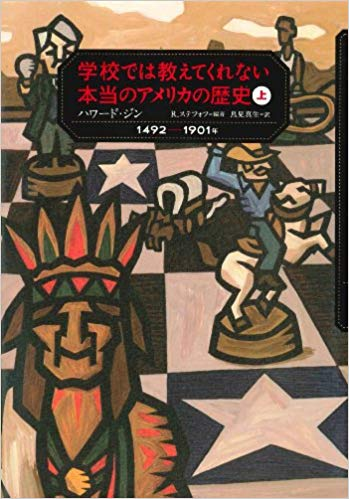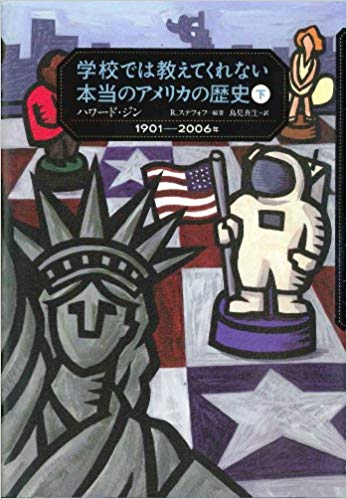Civil Disobedience 市民的不服従とは !? マット・デイモンさん朗読のハワード・ジン教授 "Our Problem is Civil Obedience"

ハリウッド俳優、マッド・デイモンさん。
どの映画見た ?
今日は、マット・デイモンさんが敬愛する歴史学者で哲学者の Howard Zinn 教授の名文を学んでみよう !


こういう本は、英文のほうが読みやすかったりします~。
民主主義 (democracy) の歴史は、公民権 (civil rights) の歴史でもあります。
最低限の民主主義の歴史を知っておくことは、民主主義の本質 (Spirit of Democracy) をきっちりとつかんでおくために大切です。
子供の頃に、ソクラテスが「悪法も法は法」といって死んだ、という話を聞いて、うわぁーーー、ソクラテス、それ違うんじゃないのー、って思った記憶あるけど、
ほんとにソクラテスは「悪法でも法は法」なんてことを言ったのでしょうか。
悪法を遵守することを肯定していたら、いつまでたっても社会悪はなくなりません。民主主義国家も成立しません。
というのも、民主主義の歴史は「悪法」との戦いだったからです。
権力はいくらでも悪法を作り、法解釈を都合よくゆがめ、法を守れ、と人々の首に悪法をつきつけてきました。
現役職員がみとめた加計問題、それでも調査せず、おまゆーパターン。

長年の民意と選挙結果を無視し、国民に法は守れといってるパターン

サンゴも移植せず利権企業が儲けるような違反工事が明らかになっています。

悪政と戦争の独裁政権も、
法治国家だったし、
民主主義の法治国家とどこがちがうのだろう!?
法治国家、という言葉を政府が語るとき、政府が法を都合よく圧政の道具にしているということに気づくことのできる国民は、この日本にはどれくらいいるんだろう!?
だから、
民主主義を学ぶときには、
民主主義のカタチではなく、
民主主義の歴史を学ぶことから始めなきゃいけない。
カタチではなく、
中身が大切だからです。
カタチは整って見えても、中身が腐敗していることもたくさんあるからね。
民主主義と公民権。
日本の学校では、キング牧師やガンジーの非暴力抵抗運動 (non violent protest) は教えても、その実践とセットになっている思想のほう、市民的不服従 (civil disobedience) は教えないですね。
日本の学校で習わないので、海外に留学してまず戸惑ったのが、この言葉です。
市民的不服従 (civil disobedience) とは、
市民が良心に従って政府の命令や法律に従わないこと。
1776年の、Thomas Jefferson の 独立宣言 (Declaration of Independence) にも、政府の権力の乱用と権利の侵害に対して抵抗することは、人民の権利であり義務であると書かれていますね。
しかし、権力の乱用と権利の侵害が、常に同じ目標に 向けて長期にわたって続き、人民を絶対的な専制の下に置こうとする意図が明らかであるときには、その ような政府を捨て去り、自らの将来の安全のために新たな保障の組織を作ることが、人民の権利であり義務である。
今日は、ハリウッド俳優のマッド・デイモンさんによる、政治哲学者ハワード・ジン (Howard Zinn) 教授の逆説的な市民的不服従論の朗読から学んでみたいと思います。
ジン教授は、問題なのは、市民的不服従じゃない。私たちの問題は、市民的服従だ、と語ります。
なぜ常に私たち市民は悪政と悪法に服従してきたのか、それこそ、私たち自身が考え学んでいきたいと思います。
"I start from the supposition that the world is topsy-turvy, that things are all wrong, that the wrong people are in jail and the wrong people are out of jail, that the wrong people are in power and the wrong people are out of power, that the wealth is distributed in this country and the world in such a way as not simply to require small reform but to require a drastic reallocation of wealth. I start from the supposition that we don't have to say too much about this because all we have to do is think about the state of the world today and realize that things are all upside down."
"Now if you don't think, if you just listen to TV and read scholarly things, you actually begin to think that things are not so bad, or that just little things are wrong. But you have to get a little detached, and then come back and look at the world, and you are horrified. So we have to start from that supposition-that things are really topsy-turvy."
"And our topic is topsy-turvy: civil disobedience. As soon as you say the topic is civil disobedience, you are saying our problem is civil disobedience. That is not our problem.... Our problem is civil obedience. Our problem is the numbers of people all over the world who have obeyed the dictates of the leaders of their government and have gone to war, and millions have been killed because of this obedience."
"We recognize this for Nazi Germany. We know that the problem there was obedience, that the people obeyed Hitler. People obeyed; that was wrong. They should have challenged, and they should have resisted; and if we were only there, we would have showed them. Even in Stalin's Russia we can understand that; people are obedient, all these herdlike people."
"Remember those bad old days when people were exploited by feudalism? Everything was terrible in the Middle Ages-but now we have Western civilization, the rule of law. The rule of law has regularized and maximized the injustice that existed before the rule of law, that is what the rule of law has done."
"When in all the nations of the world the rule of law is the darling of the leaders and the plague of the people, we ought to begin to recognize this. We have to transcend these national boundaries in our thinking. Nixon and Brezhnev have much more in common with one another than - we have with Nixon. J. Edgar Hoover has far more in common with the head of the Soviet secret police than he has with us. It's the international dedication to law and order that binds the leaders of all countries in a comradely bond. That's why we are always surprised when they get together -- they smile, they shake hands, they smoke cigars, they really like one another no matter what they say."
"What we are trying to do, I assume, is really to get back to the principles and aims and spirit of the Declaration of Independence. This spirit is resistance to illegitimate authority and to forces that deprive people of their life and liberty and right to pursue happiness, and therefore under these conditions, it urges the right to alter or abolish their current form of government-and the stress had been on abolish. But to establish the principles of the Declaration of Independence, we’re gonna need to go outside the law, to stop obeying the laws that demand killing or that allocate wealth the way it’s been done, or that put people in jail for petty technical offenses and keep other people out of jail for enormous crimes."
"My hope is that this kind of spirit will take place not just in this country but in other countries because they all need it. People in all countries need the spirit of disobedience to the state, which is not a metaphysical thing but a thing of force and wealth. And we need a kind of declaration of interdependence among people in all countries of the world who are striving for the same thing."
In the Eyes of Étranger: 《和訳》俳優マット・デイモンが生涯の友ハワード・ジンの『市民的不服従論』を朗読
世界は常にあべこべ
まず私は、こう仮定することから始める。
この世界はすべてがあべこべだと。
すべてが間違っており、
間違った人びとが罪を問われ、
あるいは罪を問われず、
権力を握り、
あるいは権力の座を追われ、
そしてこの国や世界の富が、
小手先の改革ではなく、
劇的な富の再分配を必要とするような
間違った分配のされ方をしている、と。
また私はこう仮定することから始める。
このことについて、異論などある筈もない、と。
なぜなら、ちょっと踏みとどまって
世界の状況のことを考えてみれば
誰でも、この世界のすべてが
あべこべだということに気付くからだ。
もし考えることをせずに、
TVや学者の言うことだけを信じていれば、
「現実はそんなに悪くないさ」
「些細なことがおかしいだけさ」と、
思ってしまうことだろう。
だが、少し離れたところから見てみると、
世界のありようが、見えてくるようになる。
そして、恐ろしくなってくるだろう。
だから、この仮定から始めなければならない。
世界はすべてあべこべなのだと。
「市民的服従」こそが問題
そして、「市民的不服従」という
この話題もまた、実にあべこべだ。
「市民的不服従」を話題にした突端、
「市民的不服従に問題がある」と、
言っていることになる。
問題は、そこにあるのではない。
問題は、「市民的服従」にある。
問題は、世界中の多くの人びとが、
それぞれの政府の指導者の命じるがまま、
付き従ってきたことにある。
そして服従したがために、戦争が起こり、
数百万もの人びとが殺されたことにある。
ナチスドイツがまさに、そうだった。
問題が服従にあったことは、もう分かっている。
人びとは、ヒトラーに従った。
人びとは従った。それが間違いだった。
人びとは疑問を唱えるべきだった。
そして抵抗すべきだった。
我々がその場にいたら、きっと、
そうして見せただろう。
スターリンの時代のロシアでもそうだった。
人びとは従順だった。まるで家畜のように。
封建制度のもと、人びとが搾取された
あの忌まわしき時代のようではないか。
中世は、あまりにも悲惨な時代だったではないか。
しかし現代においては、
西洋文明が栄え、「法の支配」がある。
法の支配がもたらしたもの
「法の支配」は、それ以前に存在した
社会的不正を規則化し、かつ極大化した。
それが、「法の支配」がもたらしたものである。
世界のあらゆる国で、
指導者が法の支配をこよなく愛する一方で、
人びとにとってそれが災いでしかないとき、
我々は気付かなければならない。
我々の思考の中で、
国と国を分かつものを越えなければならない。
権力と戯れる者たち
ニクソン大統領は、我々よりも
むしろブレジネフ書記長に共鳴していた。
フーバー長官は、我々よりも
むしろソ連秘密警察の長官に
はるかに共鳴していた。
法や秩序に対する国際奉仕の精神が、
世界中の指導者たちを、
まるで同志のような堅い絆で結んだ。
だから、我々は常に驚かされる。
彼らが一堂に会すと、必ず笑みを絶やさず、
堅い握手を交わし、仲良く葉巻をふかすからだ。
表で何と言おうと、彼らは本当は
最も共鳴し合っているのである。我々の為すべきこと
では、我々は何を為そうとしているのか。
それは、多分、合衆国の『独立宣言』の理念、
目標、そして精神に立ち返ることであろう。
その精神とは即ち、不当な権力や、生存、自由、
および幸福の追求の権利を奪う勢力に対する
抵抗の精神を意味する。
したがってそのような状況下では
現行の政府を改造または廃止する
権利の発露が要請されるということである。
ここで強調されるのは「政府の廃止」だ。
法の外へ出でよ
しかし、『独立宣言』の理念を確立するためには、
「法の外」へと出なければならない。
殺人を強要したり、これまでのような富の配分を行うこと、
矮小な、厳格な法解釈のみでしか成立しえない罪を問い、
大罪を犯した者の罪を問わないことを求める法に
従うことをやめなければならない。
私の願いは、こうした精神の発露が、この国だけでなく、
他の国々でも起きることだ。なぜなら、どの国にも
必要な精神だからだ。
世界のあらゆる国々の人びとに、
国家に対する不服従の精神が求められている。
それも、抽象的なものではなく、
力と豊かさに溢れるものが。
そして、同じものを希求する世界中の
すべての国々の人びとが、
『相互依存宣言』を行うことが
求められているのだと思う。